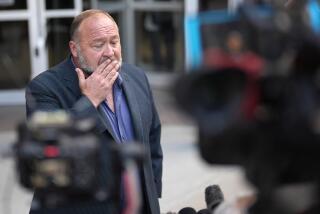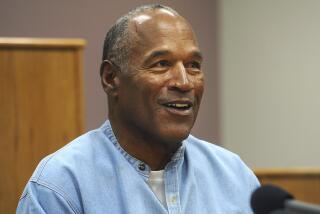Goldman Seeks Separation From Plaintiffs
- Share via
Lawyers for Fred Goldman argued Friday that they need the freedom to go after O.J. Simpson’s assets independently, and urged a judge not to force them to coordinate every move with the Brown family.
Goldman attorney Peter Gelblum emphasized that his team is “hoping to avoid any conflict” among the three plaintiffs, who won a combined $33.5-million verdict against Simpson last month.
But in case the parties find they cannot work together, Goldman’s lawyers want to be able to seize Simpson’s home, collect his bank accounts or attach his other assets without consulting the other parties--or sharing the spoils. “We don’t want to run around bumping heads with each other,” Gelblum said. “We want to work together. But we also want the maximum amount of flexibility.”
In a brief filed Friday with Superior Court Judge Hiroshi Fujisaki, Gelblum pointed out that any money the Brown family collects will flow to the children of Nicole Brown Simpson and O.J. Simpson. Because the children are living with O.J. Simpson, Gelblum suggested that the Browns may be reluctant to strip away Simpson’s estate or seize his luxuries.
“Brown’s attitude, motivation and interest in enforcing the judgment against [Simpson] are entirely different from Goldman’s,” Gelblum wrote.
Fujisaki could affect how closely the plaintiffs work together when he decides how to codify the jury verdict.
The judge could sign three separate judgments--one for Goldman; one for Ronald Goldman’s mother, Sharon Rufo; and one for the Simpson children, represented by their grandfather, Lou Brown. That approach would allow each plaintiff to pursue collection efforts independently. It could also touch off a race to grab Simpson’s assets.
Fujisaki’s other option is to sign a single judgment consolidating the awards for all three parties. Gelblum said that even under this scenario, each plaintiff would have the right to go after Simpson’s money independently. But other analysts said a consolidated judgment would force the plaintiffs to cooperate. “They would work out among themselves how to divide the funds,” Encino business attorney Ronald Michelman said.
Rufo, Brown and Simpson all back the idea of a consolidated judgment.
Although he would not comment Friday, Brown attorney Edward Horowitz has warned that separate judgments could spark a “race to the recorder’s office” as each plaintiff scrambled to collect. He has also said separate judgments could create administrative hassles for the court.
In a brief filed Friday, Simpson attorney Daniel Leonard echoed that argument. Separate judgments, he wrote, would “result in inefficiencies, conflicts and confusion for all parties involved.”
Fujisaki may rule on the format for the judgments as early as Monday. He could also decide to hold a hearing on the issue.
The plaintiffs can start collecting Simpson’s assets 10 days after the court clerk notifies them that Fujisaki has signed a judgment.
Simpson, who was found liable for the slayings of his ex-wife Nicole Simpson and her friend Ronald Lyle Goldman, owes his children $12.5 million, Goldman nearly $13.5 million and Rufo about $7.5 million. The defense plans to appeal the verdicts. Simpson’s team must file the appeal within 25 days of receiving notice that Fujisaki has signed the judgment.
More to Read
Inside the business of entertainment
The Wide Shot brings you news, analysis and insights on everything from streaming wars to production — and what it all means for the future.
You may occasionally receive promotional content from the Los Angeles Times.










